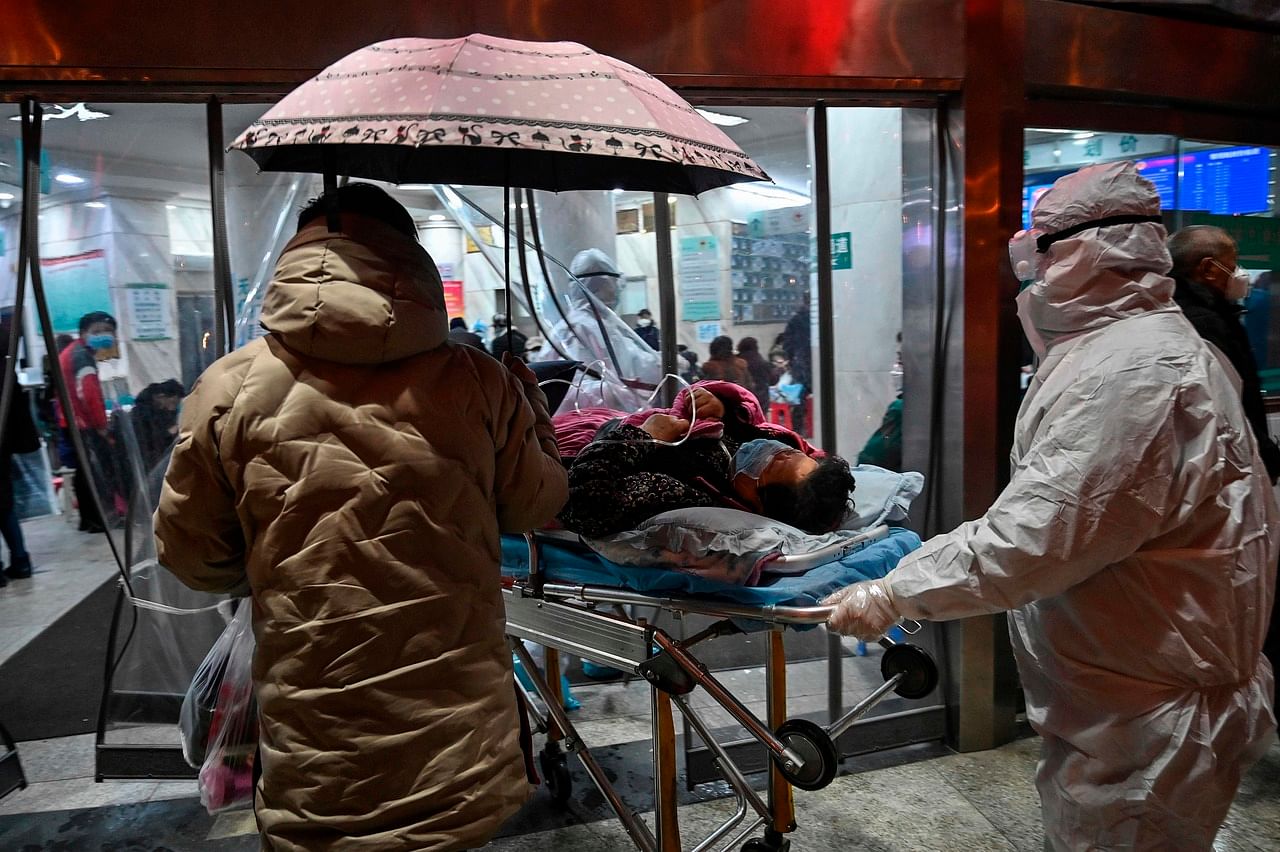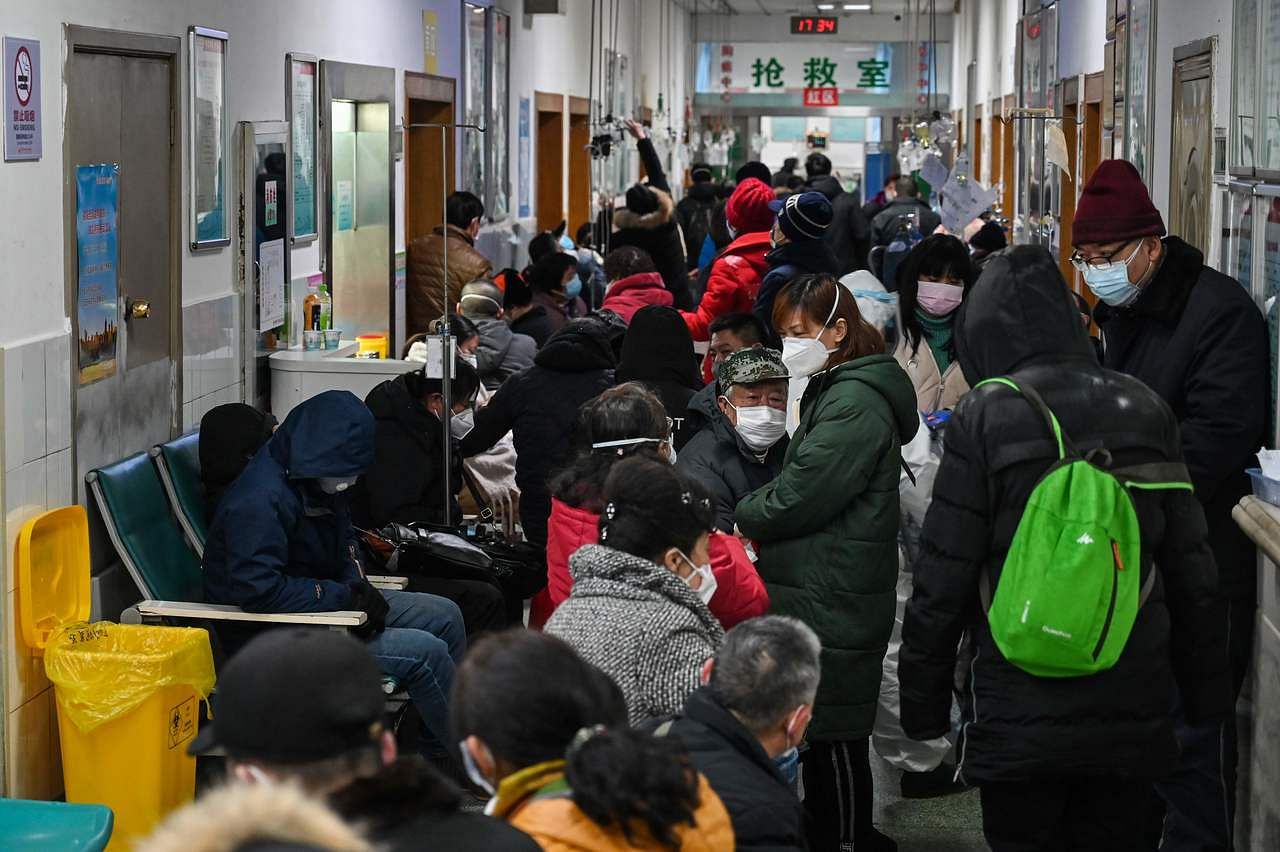WUHAN (NYTIMES) - After suffering from a fever and breathing problems for more than 15 days, Xiao Shibing, a 51-year-old resident of Wuhan, China, finally sought help at a hospital.
Despite the symptoms, he was not tested for the new coronavirus - a lapse suggesting that there may be far more cases of the virus than are being officially reported.
Instead, Xiao was told that he had a viral chest infection, so he went back home. As he grew sicker, he went to three other hospitals. But they told him they did not have enough beds.
Like many of the thousands of Chinese patients dealing with this new coronavirus, Xiao is scrambling to get help from a health care system straining to serve even the basic needs of patients.
"It is like kicking a ball from here to there," said his wife, Feng Xiu.
Xiao, who was eventually hospitalised on Sunday (Jan 26) - about a week after his initial attempt - still hasn't been tested for the pneumonia-like virus.
As it struggles to combat a coronavirus epidemic that has sickened more than 2,700 people and killed 80, the Chinese government is relying on a medical system that is overburdened and overwhelmed even in normal times. While other parts of everyday life in China have significantly improved in the past decade, the quality of health care has stagnated.
In major cities like Beijing and Shanghai, many people have to stand in line in the wee hours of the morning to secure appointments with doctors. When they do get an appointment, patients get only a couple of minutes with a doctor. During flu season, residents set up camp overnight with blankets in hospital corridors.
China does not have a functioning primary care system, so most people flock to hospitals. On an ordinary day, doctors are frustrated and exhausted as they see as many as 200 patients.
Those weaknesses are most pronounced in the poorer areas of China - like Wuhan, the epicentre of the coronavirus. Panicked residents of the city are heading to the hospitals if they have any sign of a cold or cough.
Videos circulating on Chinese social media show doctors straining to handle the enormous workload and hospital corridors loaded with patients, some of whom appear to be dead.
Despite having dealt with the Sars coronavirus nearly two decades ago, many Chinese hospitals in smaller cities are not fully prepared to deal with a major outbreak like the current virus. Wuhan hospitals have posted messages online urgently appealing for medical equipment. The situation is even more desperate in poorer, rural areas nearby.

Last week, eight hospitals in Hubei province - where Wuhan is situated and where most of the cases have appeared - put out a call for N95 masks, goggles, surgical masks and surgical gowns. In the absence of proper equipment, some medical workers have resorted to cutting plastic folders to jury-rig goggles.
Yanzhong Huang, a senior fellow for global health at the Council on Foreign Relations, said that China had invested a lot in building a robust public health infrastructure in the wake of Sars and that many of them were mostly well equipped to deal with infectious diseases.
"But they apparently didn't anticipate something so sudden, so acute, and so tremendous," he said.
The government's response to the crisis could exacerbate the problems. Across China, the authorities are sealing off cities, closing down schools and checking on residents. But the lockdown - affecting 56 million people - could make it difficult to get medical supplies to hospitals that desperately need them.

Chinese officials have acknowledged that they are struggling to deal with the outbreak. At a news conference last week, the Wuhan health commission said there were long lines and a shortage of beds. In response, it said it had designated hospitals as "fever clinics" for people to go to for treatment.
With medical facilities in short supply, the local government has also pledged to build a new 1,000-bed hospital in 10 days, and vowed that another new 1,300-bed hospital would be ready by the middle of next month. It is taking a page out of the government's playbook during Sars, when it built a new hospital in Beijing in just a week.
Yet it is still not clear that there will be sufficient beds to deal with the virus, which remains highly contagious.

Chen Xi, an assistant professor of health policy and economics at the Yale School of Public Health, said it was more important to have a working system of family doctors who can act as gatekeepers for the hospitals.
"Without an efficient screening process," he said, "these two hospitals would not be very effective."
The central government is under increasing pressure to show that it is adequately coping with the crisis. On Monday, Premier Li Keqiang, who has been assigned to oversee the national response to the outbreak, visited Wuhan to inspect efforts to contain the disease. He pledged to provide local health centres with 20,000 pairs of safety goggles.
As the government scrambles to contain the outbreak, the sick are just trying to get medical attention.
Cai Pei, 41, said his wife had begun coughing and developed a fever three days ago. He wrote on Weibo, a popular social media platform, that hospitals would not admit her, and that he had difficulty finding masks and cold medicine in pharmacies.
Making matters worse, three Chinese medical companies have said that they do not have the capacity to make enough test kits for the new coronavirus, according to local news media reports.
Cai and his wife still do not know whether she is infected with the coronavirus or another more common ailment.
"Sometimes I can only hide and cry, but I couldn't tell her and had to reassure her that it is not the virus," Cai said by telephone. "It is very scary. If it's real, we have a child and elderly parents at home. What if we all get sick?"

With no proven drugs to treat the new virus, the health authorities have told doctors to prescribe a combination of treatments - anti-viral HIV drugs as well as traditional Chinese medicine - to patients. Some of the medicines being prescribed are a mixture of ingredients like buffalo horn, jasmine and honeysuckle as well as anti-viral HIV drugs like lopinavir and ritonavir.
As happened with Sars, traditional Chinese medicine - an industry that the government has pledged to develop - is prominently being touted as a way to treat this new coronavirus. But there is no clinical evidence that the gallstones of cattle, the roots of plants and licorice could work in combating it.
Journals have published studies by Chinese scientists saying that traditional Chinese medicine helped alleviate symptoms of Sars. China's ministry of science and technology said in 2003 that it had found banlangen, the root of the woad plant, as well as a liquid made up of ingredients like cholic acid, jasmine, buffalo horn and honeysuckle to be effective in curing an acute inflammation of the lungs.
"There has never been a good antiviral agent, so that means that people would try things that have some effect," said Dominic Dwyer, a medical virologist at the University of Sydney. "But there's no evidence of significant benefits with any antiviral drugs or traditional Chinese medicine."
The problem with finding a drug that can effectively fight an infectious disease like this coronavirus, Sars or Middle East respiratory syndrome is that it needs to be tested in sufficient numbers in a randomised way in proper clinical trials. Patients must also give informed consent.
"That is very difficult in an outbreak situation," said Kanta Subbarao, a senior researcher on respiratory illnesses at the Doherty Institute in Melbourne, Australia.
In Wuhan, Xiao's daughter, Xiao Hongxia, said her father had been diagnosed with severe pneumonia and was now labelled a "highly suspicious case."
He is relying on ordinary fever medicines and anti-inflammatory drugs, she said.
"There is no special medicine for the coronavirus so far," Xiao said, "so we can only rely on the patient's own immunity."











